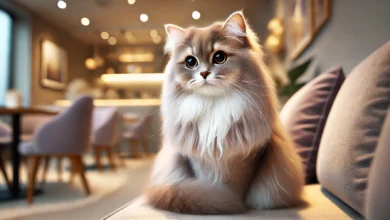The Bombay Cat: A Mini Panther
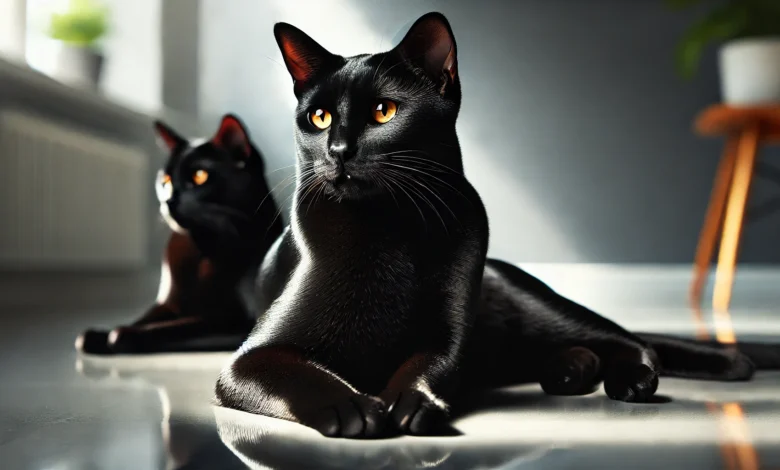
Have you at any point took a gander at a feline and felt that maybe it very well may be confused with a smaller than usual puma?
Indeed, with the smooth dark fur and striking brilliant eyes of the Bombay Cat, this could simply be just catlike.
Named the ‘small scale jaguar’ of the feline world, the Bombay Cat is for sure such a variety—a feline that stands out because of its extraordinarily looking appearance and enchanting person.
From the most engaging history down to the unique consideration taken for this variety, the Bombay Cat takes you through all that you need to be aware of this variety.
Table of Contents
The Bombay Cat: History and Origins
The Bombay Cat is one of the most extravagant ever, tracing all the way back to the center of the twentieth hundred years.
The variety was made by a woman named Nikki Horner, who needed to create a feline looking like a got away from wild puma, having the demeanor of a normal house feline.
Her fantasy was then acknowledged with the introduction of a dark American Shorthair crossed with a Burmese—the delightful, puzzling Bombay Cat.
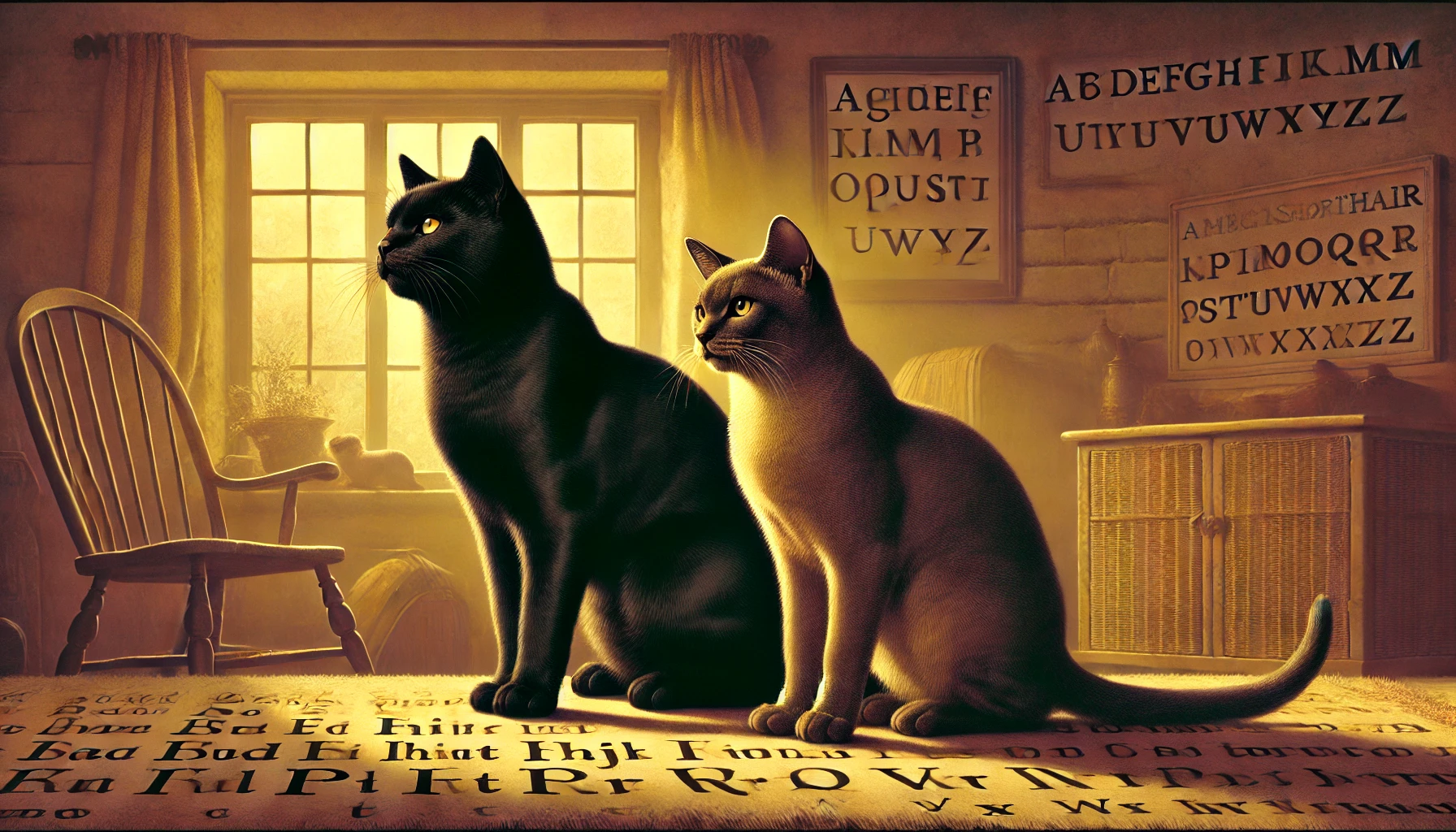
The Birth of a New Breed
Nikki Horner, a local feline reproducer from Louisville, Kentucky, began her rearing system in 1958.
She needed to get a shiny dark feline with the presence of a little puma, which became the foundation of the Bombay Cat.
She chose the American Shorthair for its strong wellbeing and sparkling coat and the Burmese for its strength and cordial person.
It was only after long stretches of cautious rearing and choice that a Bombay Cat was conceived, really having caught the presence of the wild jaguar in a little, tamed bundle.
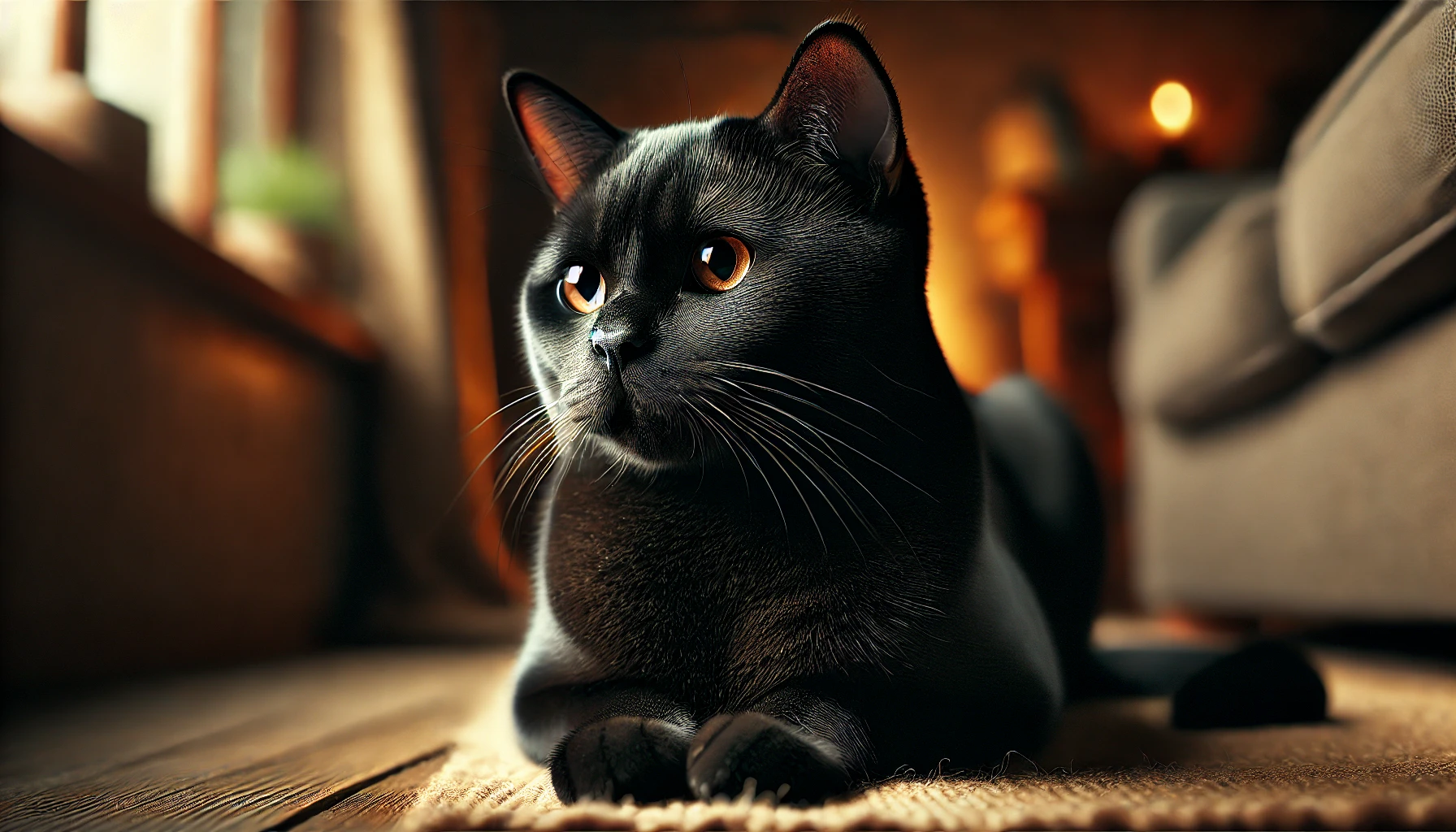
The Influence of the American Shorthair
The American Shorthair was another variety instrumental in the improvement of the Bombay Cat.
Known for serious areas of strength for its and short, shiny coat, the American Shorthair added to the mark look of the Bombay Cat to be ebony and focusing in the light.
This breed likewise got a reasonable personality into the Bombay Cat, so they end up being extremely cool headed colleagues.

Nikki Horner’s Vision
Nikki Horner had as a top priority giving the feline world a creature that was both lovely and well disposed, which was fully realized with the Bombay Cat.
All her persistent effort unquestionably more than paid off since the Bombay Cat was enlisted with Feline Fanciers‘ Affiliation (CFA) in 1976.
Horner’s fantasy of a ‘Small Jaguar’ with a decent, sweet personality understood, and Bombay Cats turned into a hit among feline fanciers.
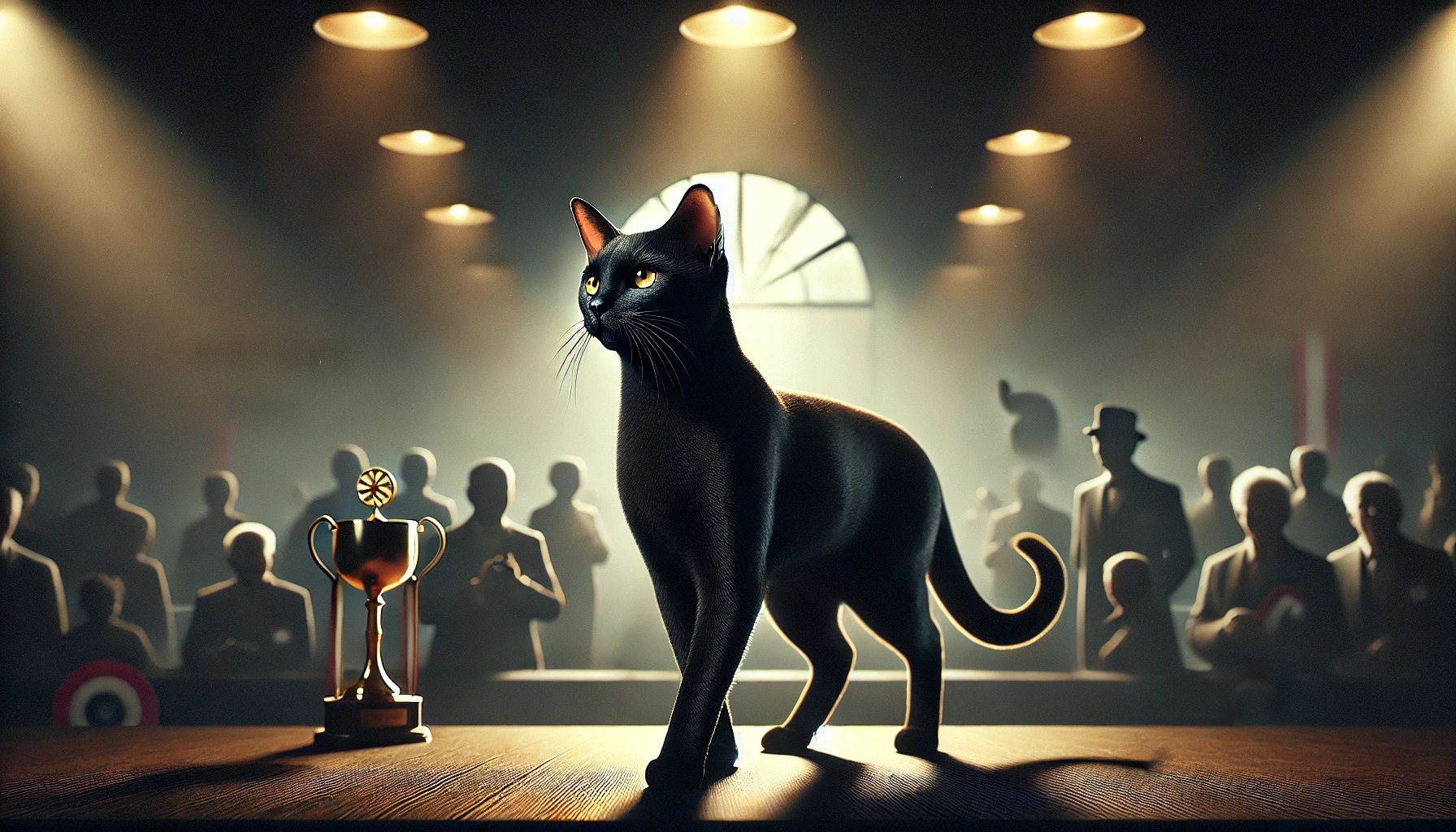
The Journey to Recognition
This was not a simple street to foundation for the Bombay Cat.
Truth be told, most reproducers despised the possibility of a ‘jaguar feline,’ and the variety struggled with getting into some feline shows.
In any case, through resolute endeavors and certain appeal, the Bombay Cat arose into the circle of cats.
Today, this breed is perceived by most significant feline vaults on the planet and remains profoundly appreciated because of its remarkable appearance and delicate heart.
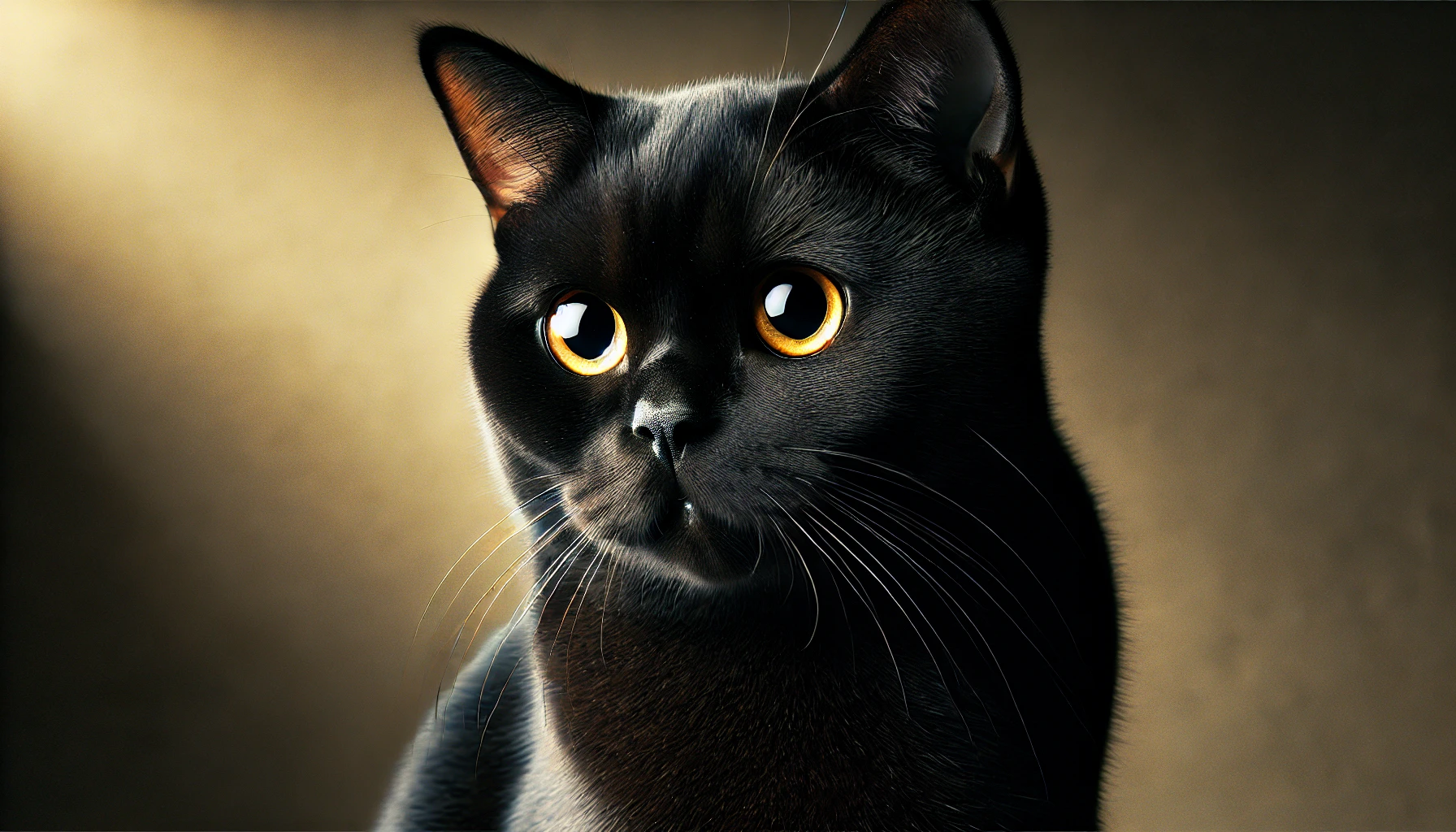
Physical Traits of the Bombay Cat
This feline is here and there alluded to as a little jaguar, which is justifiable.
Their smooth, polished dark coat, alongside those staggering brilliant eyes, gives this breed a wild and fascinating appearance, which they can undoubtedly use for their potential benefit to catch one’s consideration.
There is, nonetheless, more to a Bombay Cat than actual great looks.
How about we dive into the actual qualities that make this breed so extraordinary.

Sleek, Black Coat
The Bombay Cat is best distinguished by its patent-cowhide dark, short, thick, and smooth coat.
The feline has astonishing fur that should mirror light and give the feline an appearance that seems to be patent calfskin.
This is such a significant person characteristic that some other coat tone would preclude the feline from being a genuine Bombay Cat.
The dark coat is acquired from the American Shorthair parent and is areas of strength for extremely its hereditary qualities—probably the best attributes of this variety.
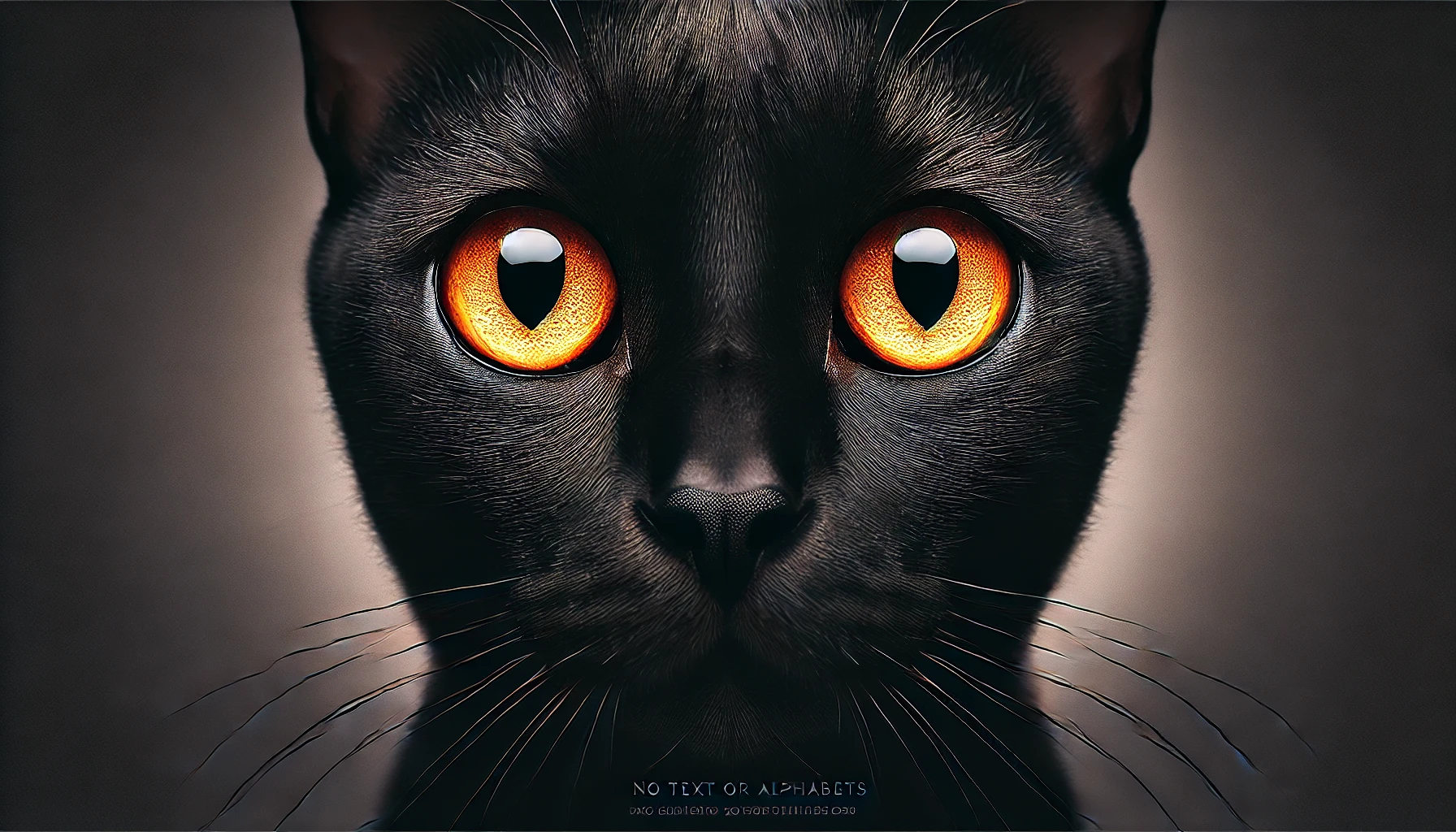
Golden Eyes: A Striking Feature
Its huge, round eyes are orange in variety, going from profound copper to radiant gold, impeccably supplementing its dark coat.
With eyes set wide separated, the Bombay Cat wears a look of readiness and interest.
One of the most striking highlights of this breed is the difference between the feline’s dull fur and sparkling eyes.
- From Copper to Gold Range of shades, the Bombay Cat’s eyes might change yet stay in an enthusiastic and brilliant shade.
- Round Shape: Its enormous, round eyes make the feline look rather cute, nearly child like in its demeanor.
- Then again, wide-set eyes give a Bombay Cat a demeanor of interminable watchfulness.

Panther-Like Stature
However little to medium in size, the Bombay Cat has a solid form that gives it puma-like elegance.
It flaunts a proportional body, wide chest, solid legs, and a somewhat adjusted head.
This breed moves with liquid effortlessness, similarly as any wild relative would.
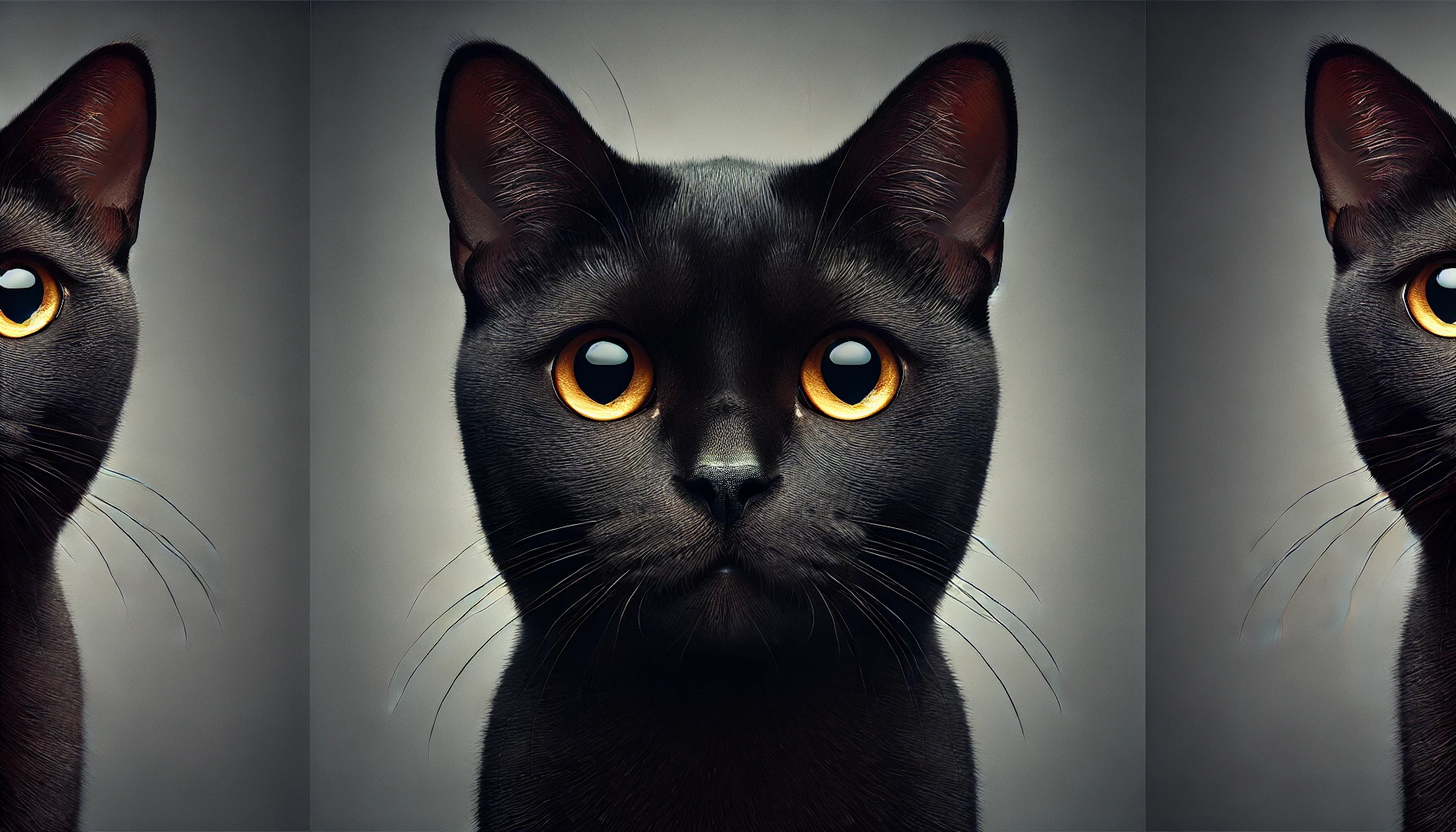
Distinctive Facial Structure
One of the Bombay Cat’s most unquestionable elements is in its facial construction.
A Bombay Cat has a short, wide gag with a slight break at the scaffold of the nose.
The ears are of medium size, adjusted at the tip, and put well aside, giving the feline a very ready and curious look.
The essence of the Bombay Cat is striking and expressive, fitting the ‘small puma’ epithet.

The Bombay Cat’s Personality and Temperament
As opposed to the appearance, which might be basically the same as that of a wild jaguar, a Bombay Cat isn’t wild in any way.
Running against the norm, this variety of feline can be portrayed as friendly and social, so it turns into a fantastic ally for the people who might want to have a really cherishing, intelligent pet.
Thus, we should figure out about the character and demeanor of the Bombay Cat.

Affectionate and Social Nature
This normally implies that a Bombay Cat would for the most part be known as a ‘velcro feline’, and for sure they flourish around individuals.
A ton of them follow their number one individual from one space to another.
In the event that you’re hoping to cuddle with and spend time with your feline, a Bombay Cat will be the smartest choice.
Other than being exceptionally connected to their proprietors, Bombay Cats are social felines that appreciate human cooperation.
They may frequently be found resting on somebody’s lap or in any event, sitting alongside their proprietors while they are working.
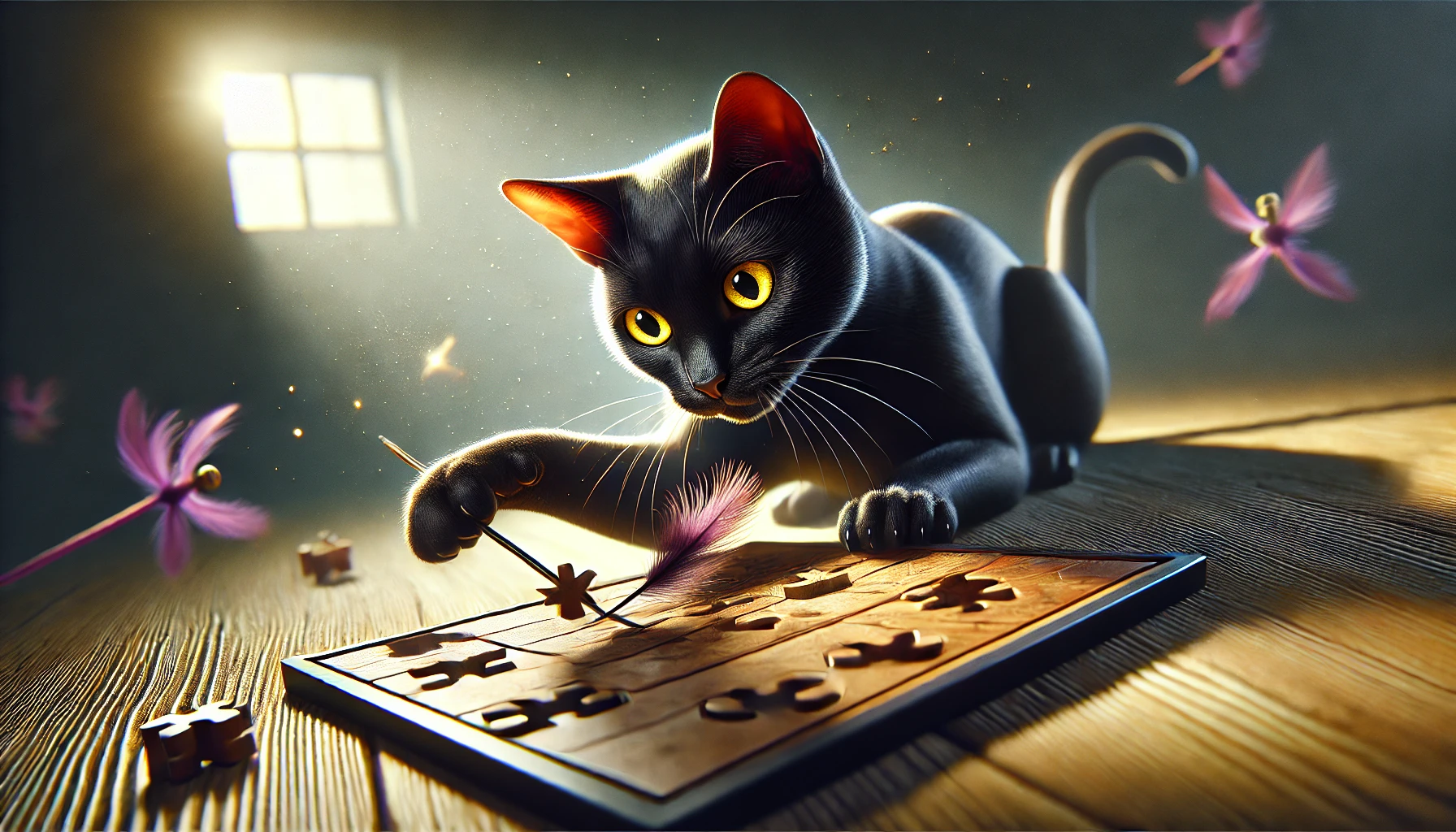
Intelligence and Playfulness
Besides the fact that the Bombay Cat is friendly yet in addition especially shrewd.
It is, without a doubt, one of those breeds that truly benefits intellectually from excitement, can be prepared to embrace a wide range of things, from recovering a ball to strolling on a chain.
Being energetic themselves, they love intelligent toys and messing around with their proprietors, accordingly ending up great allies to have around the house.
- Play Intelligent: The Bombay Cat is a feline that loves games where it needs to think, similar to confuse toys and feather wands.
- Learning Deceives: You will actually want to prepare your Bombay Cat to do a few straightforward stunts, like sitting or shaking a paw, by simply being patient and compensating with encouraging feedback.
- Attempting new things: The Bombay Cats are interested and, in this way, eagerly give a shot new toys, spaces, and exercises.
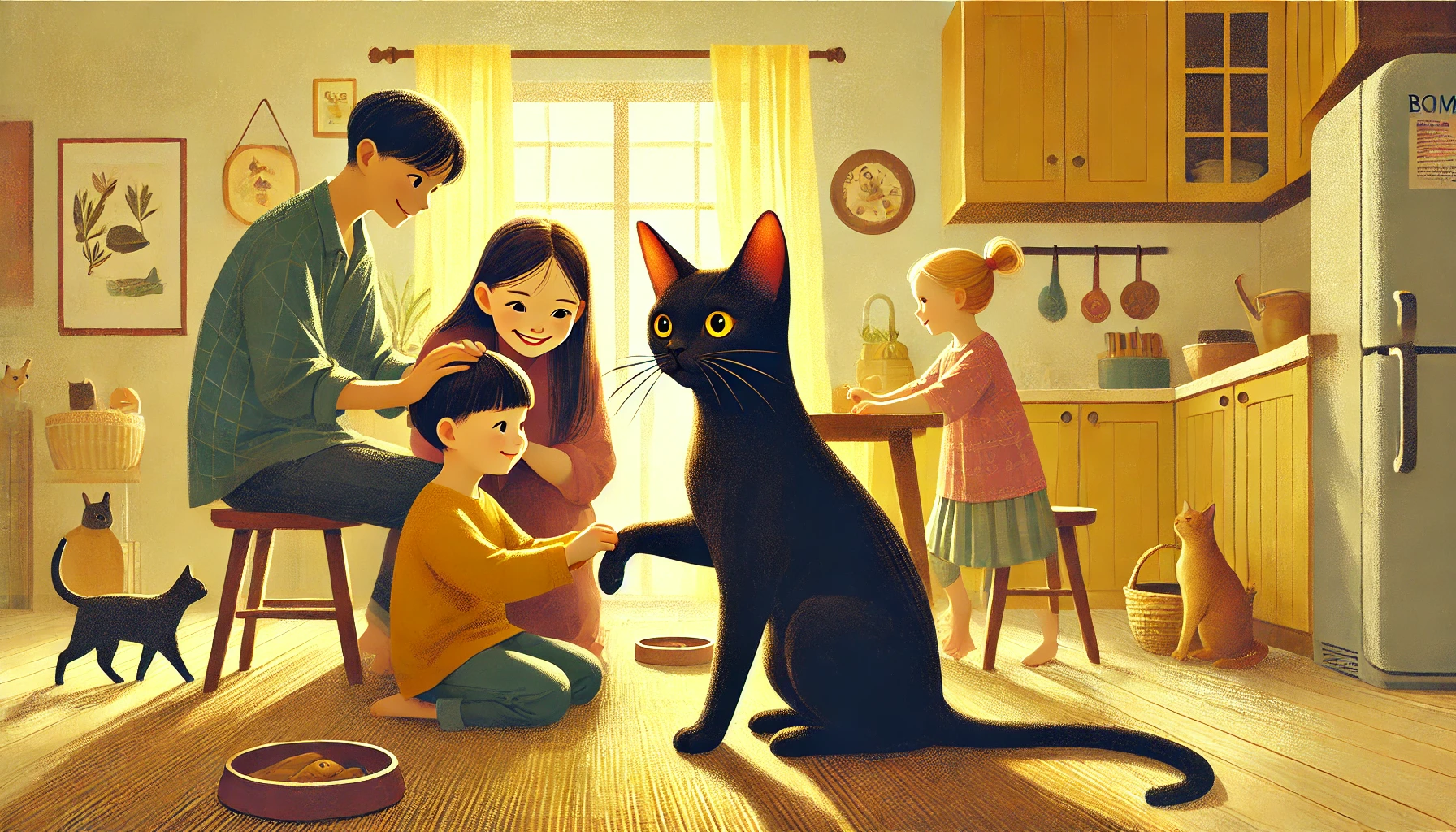
Compatibility with Families
The Bombay Cat is ideal for families, as it truly does well with the two youngsters and different pets.
The Bombay breed is described by being extremely delicate and patient, subsequently fitting in well in a home with little kids.
Other than being delicate, the Bombay Cat is additionally versatile, where it effectively changes with differing everyday environments, from boisterous families to calm lofts.

Interaction with Other Pets
The social idea of the Bombay Cat stretches out into associations with different creatures too.
This breed essentially coexists well with different felines and canines as well, if it is presented appropriately.
The Bombay Cat preferences having close companions and could frame close bonds with different pets in the family.
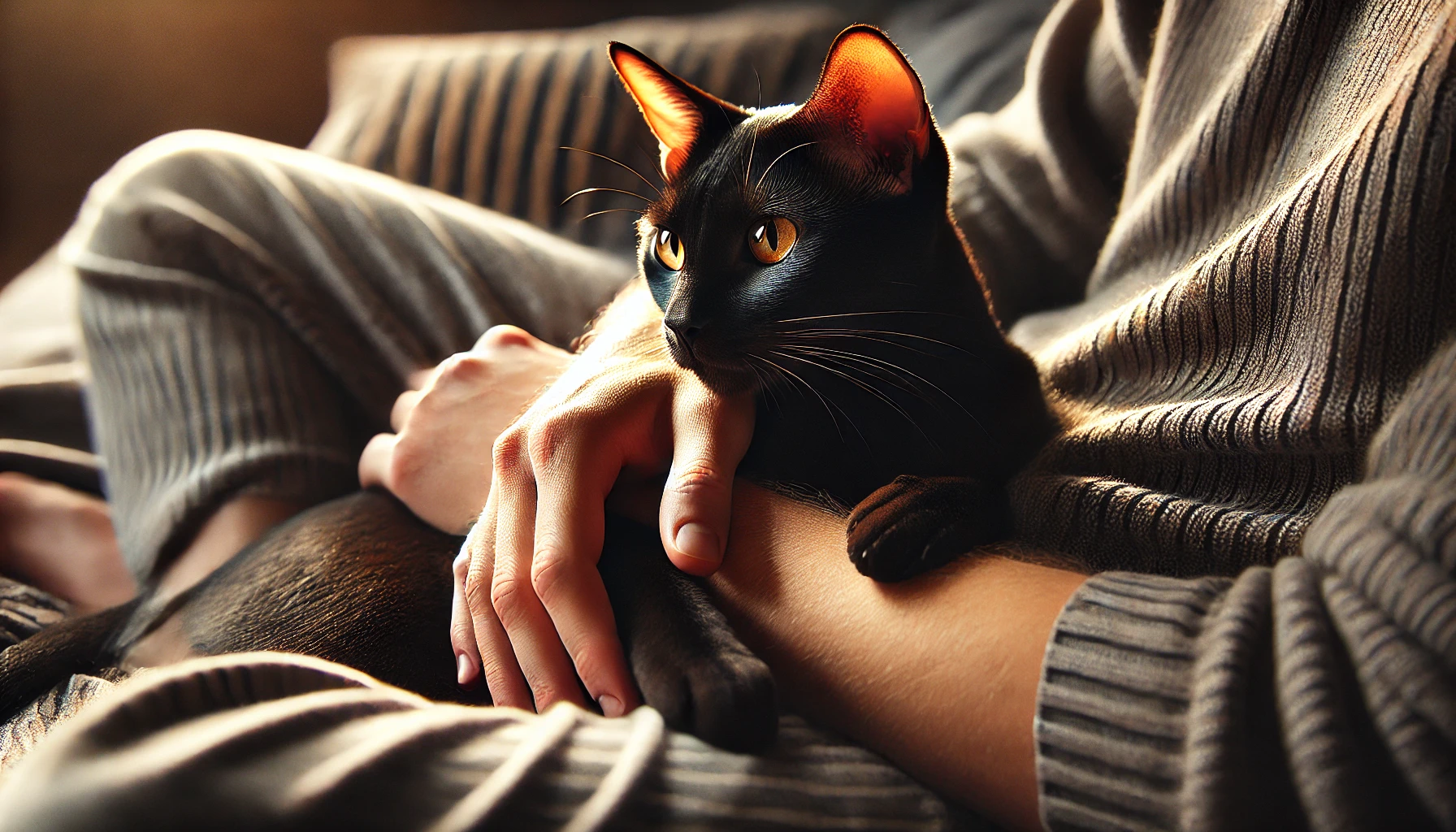
Loyalty and Attachment to Owners
One of the most beguiling characteristics of Bombay Cats, in any case, is their commitment to their proprietors.
This breed is inclined toward areas of strength for shaping connections, frequently fostering areas of strength for a with a ‘most loved individual’ in the family.
The Bombay Cat will make a special effort to search out consideration and fondness from its #1 individual, making it one of the more committed friends one could claim.

Caring for a Bombay Cat
Really focusing on a Bombay Cat amounts to a whole lot more than furnishing it with simply a rooftop over its head and food in its midsection.
Such varieties gloat smooth covers and are exceptionally friendly, so unique consideration is expected to keep this breed solid and cheerful.
Knowing the necessities of the Bombay Cat ought to keep your catlike companion in the best of spirits and wellbeing, be you a carefully prepared or new feline proprietor.

Dietary Needs for Optimal Health
Being a functioning and solid variety, the Bombay Cat will require an even eating regimen to fulfill its nourishing necessities.
Great protein-rich food sources will keep them conditioned with muscle and ready for business.
You ought to likewise screen their weight since this breed is inclined to stoutness from overloading or an absence of activity.
Blend wet and dry food to fulfill hydration needs and accommodate dental wellbeing in your Bombay Cat.
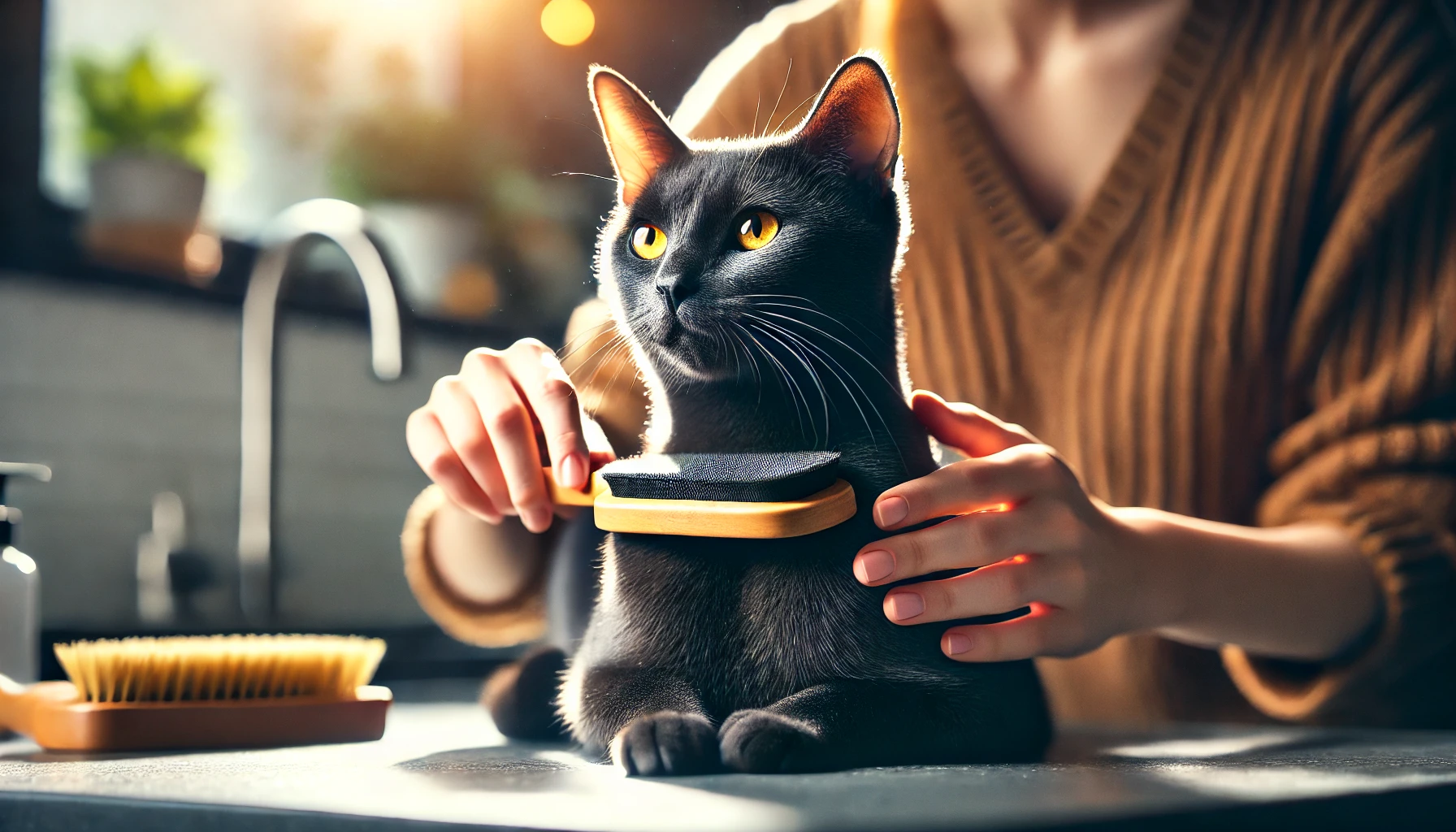
Grooming Tips for a Shiny Coat
The Bombay Cat’s short coat is not difficult to keep up with, yet ordinary preparing keeps it in top condition.
Week after week brushing eliminates free hairs and disperses regular oils, passing on their jacket with a pleasant sheen to it.
All the more significantly, the preparing meetings are a great method for holding with your Bombay Cat and study them for skin issues or parasites.
- Week after week brushing keeps them smooth.
- Check Skin Conditions: By successive preparing, you can keep an eye on your Bombay Cat for any disturbance on the skin or presence of parasites.
- Holding Time: One of the most outstanding times to bond with your Bombay Cat is the point at which you are prepping it.
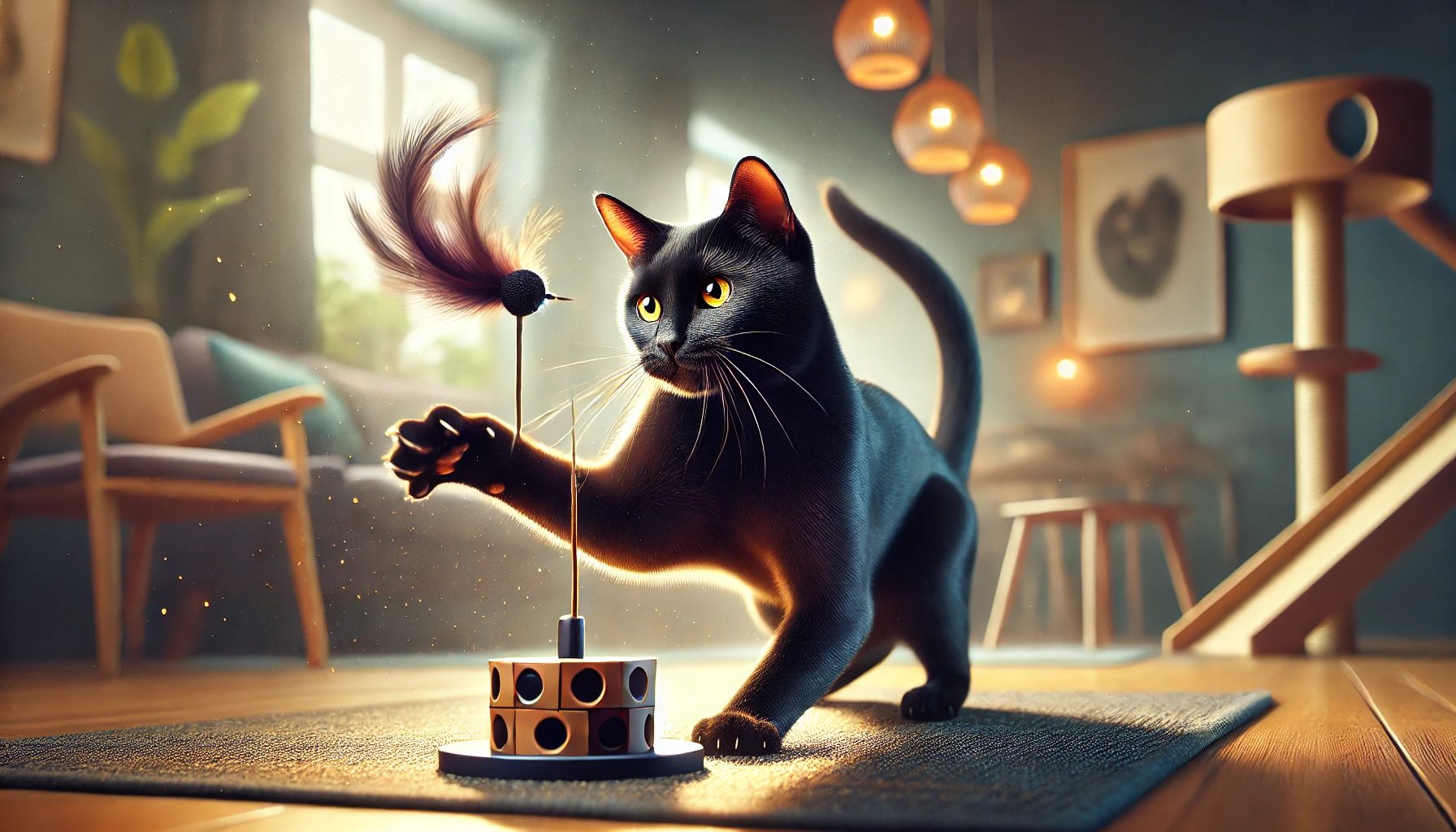
Exercise and Mental Stimulation
The Bombay Cat is a variety that is ready for business, nimble, and exceptionally canny; consequently, it requires more than adequate movement, both physical and mental, to be satisfied and solid.
You can accomplish this by giving your Bombay Cat some intelligent recess, puzzle toys, and climbing structures.
This standard activity will likewise hold them back from putting on superfluous weight and getting fat and corpulent related ailments.
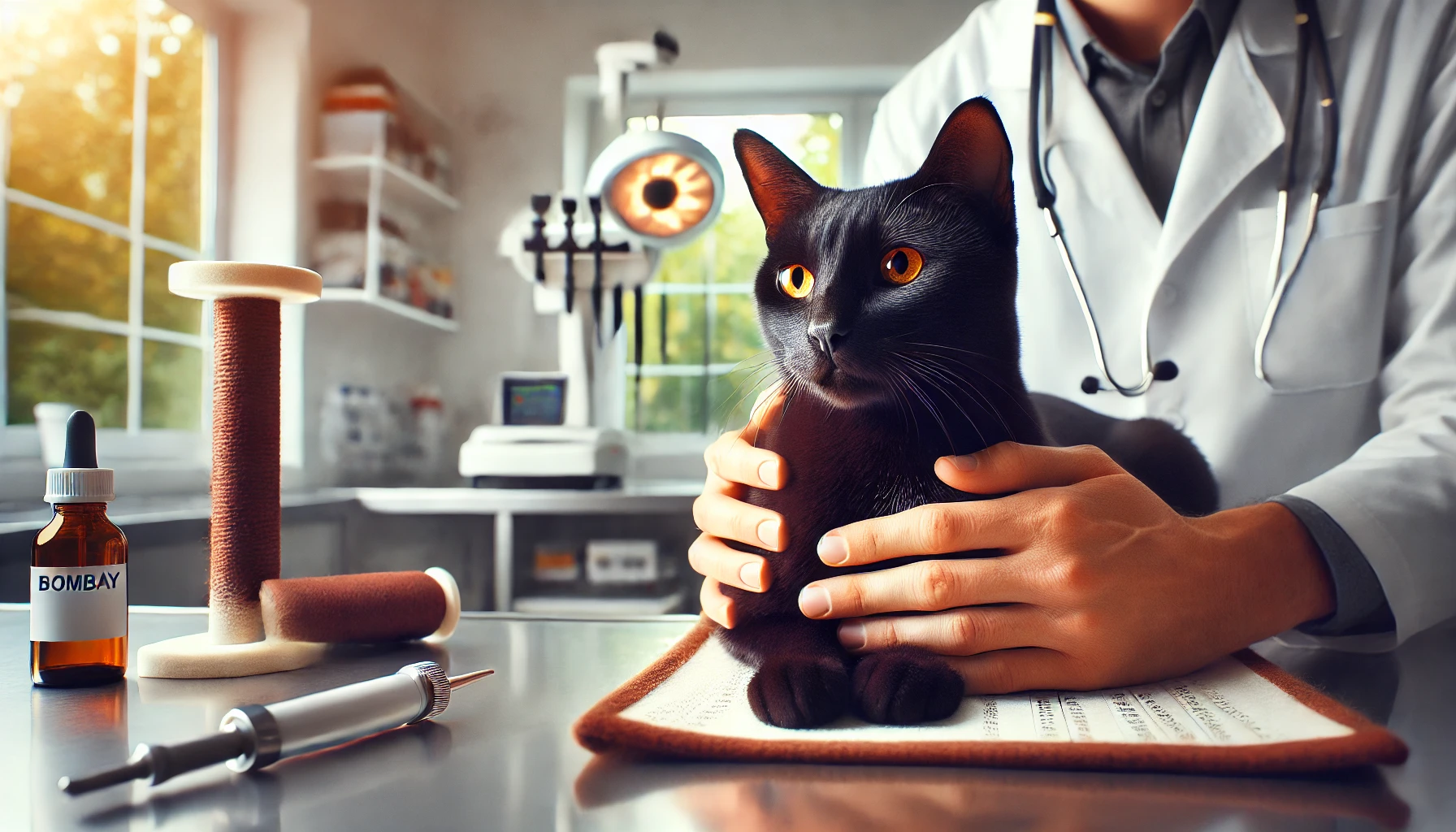
Preventive Health Care
Being a common feline, it is suggested that a Bombay Cat gets consistently booked veterinary visits and cares: inoculations, counteraction from insects and ticks, dental consideration — essentially, everything will keep your feline sound.
Additionally, it would help in avoiding normal medical issues by checking body weight and giving even sustenance.
Ensure that you pay normal visits to your veterinarian to get any of the potential medical problems early and guarantee your Bombay Cat has a long, solid life.
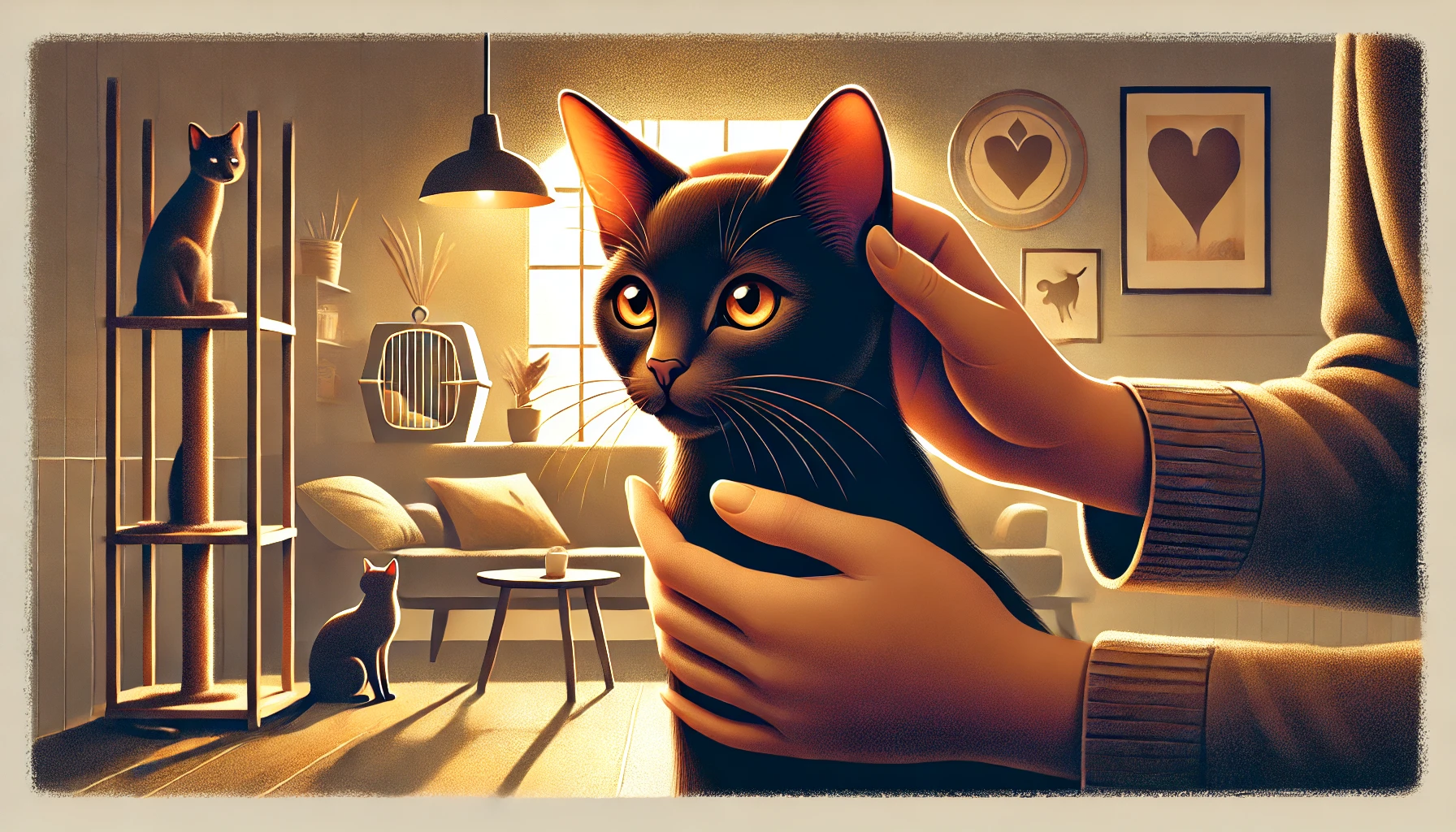
Choosing and Adopting a Bombay Cat
Taking on a Bombay Cat can be the most thrilling time, however it is one of the times for thinking and examination.
Whether through a reception place or from a decent reproducer, some thought of what’s in store will help in the change flawlessly for both you and your new kitty.
We will presently dive into how to choose and embrace a Bombay Cat.

Finding Reputable Breeders
What is the main thing while purchasing a Bombay Cat from a raiser?
The key thing is that will be that the reproducer you pick has taken great consideration of the felines and needs what is best for them.
Great reproducers will do wellbeing clearances on their rearing stock, give you data about the feline heredity, furnish you with a chance to get to know the guardians, visit offices, and perceive how the felines are kept.
- Examination and Check: Guarantee the raiser is perceived by feline rearing affiliations and has positive audits.
- Wellbeing Clearances: Solicitation veterinary records and hereditary testing for normal medical problems.
- You want to visit the raiser and make a note of the everyday environment and conduct of the felines, which will assist with pursuing your choice.
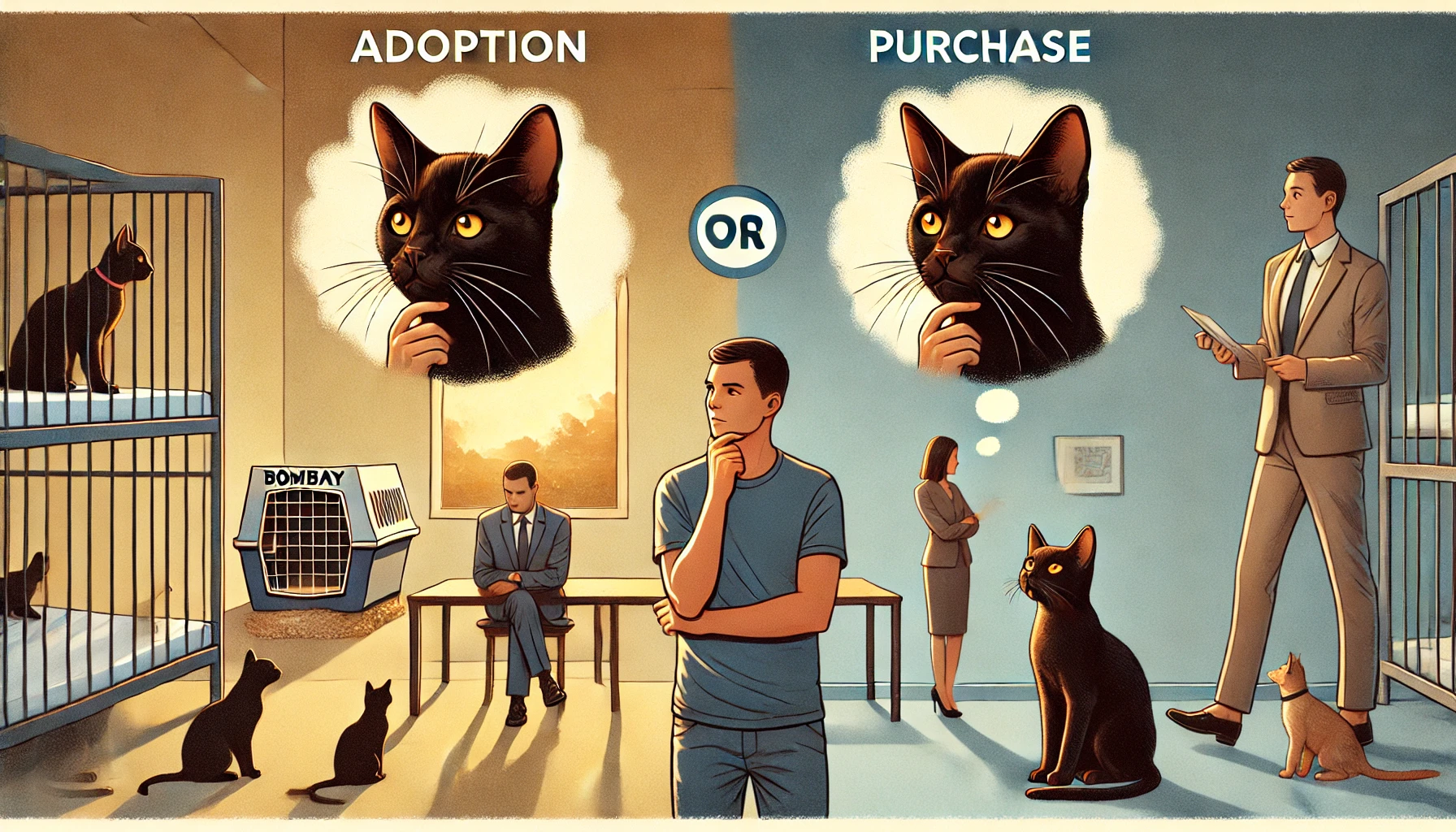
Understanding Adoption vs. Purchase
While buying from a reproducer is one choice, there is the additional extremely incredible chance of tracking down your new companion — reception — from a haven or salvage association.
More often than not, reception in a real sense saves a Bombay Cat’s life by furnishing them with a home loaded up with affection.
Taken on felines accompany psychological weight and along these lines need persistence and love to assist them with sinking into their new home.
At the point when one embraces a Bombay Cat, besides the fact that one feline allowed is a second opportunity at life, yet space at the havens is likewise made accessible for different felines hoping to be saved.

What to Expect in Your Home
Getting a Bombay Cat does, in any case, require some readiness at home.
The Bombay Cat is actually a social feline that values communication, so it ought to have a climate wherein they would have a real sense of reassurance and included.
Get a warm space with an agreeable bed, scratching posts, and a lot of toys to keep them occupied with playing.
Furthermore, guarantee that your home is well feline sealed to keep away from mishaps.
- Place of refuge: Set up one unique region for your Bombay Cat to unwind in and have a solid sense of security.
- Play Intuitive Toys: Mental and actual excitement can be achieved in your Bombay Cat with the utilization of various toys.
- Catproofing implies the evacuation of risks like poisonous plants, little articles, and open or available windows or galleries.

Costs and Long-Term Considerations
There are a few related monetary obligations to claiming a Bombay Cat, including the underlying costs of procurement or reception and the common costs of taking care of, prepping, veterinary consideration, and pet protection.
You ought to spending plan for these costs since you will need to be ready to address your feline’s issues all through its lifetime.
Much more in this way, consider the time components of Bombay Cat consideration: they need consideration, exercise, and socialization.

Preparing Your Home for a New Cat
This is the way to set up your residing climate prior to bringing your exceptionally unique Bombay Cat home: Ensure you have obtained an adequate number of duplicates, everything being equal, for example, food and water dishes, a litter box, and preparing instruments.
Make a tranquil region for your new bommie so it can bit by bit become accustomed to its environmental factors.
Present your Bombay Cat in little partitions to different pets and family occupants, preferably individually.
Readiness, most importantly, will cause your Bombay Cat to feel good and at ease from the very beginning.
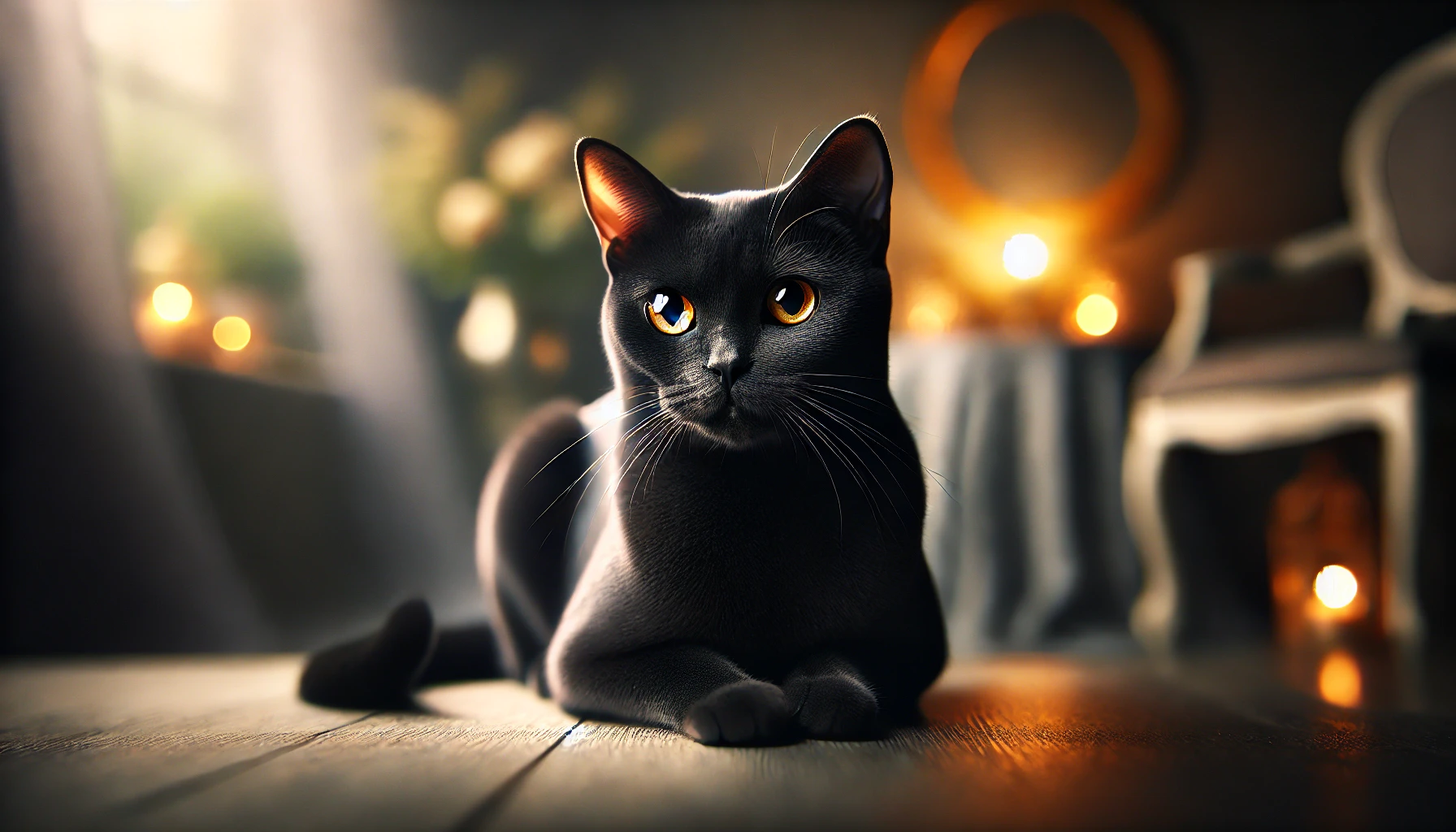
Embracing the Unique Charm of the Bombay Cat
The Bombay Cat is genuinely a variety on a whole other level, blending the outlandish appeal of a small jaguar with the delicate and social demeanor of a charming buddy.
This article has illuminated the different features of the Bombay Cat, right from its actual appearance to its connecting with character and the sort of care it requires.
However much you would bring a Bombay Cat into your home, it is quintessential to ponder what truly makes this breed unique and what sort of setting will be generally suitable to make it flourish.

A Perfect Blend of Wild and Domestic
With the smooth, dark coat and striking brilliant eyes, it’s hard not to be intrigued by the Bombay Cat.
In any case, underneath this outside of the wild monster beats a delicate and friendly soul that can’t get enough of its human family.
It’s this definite blend of wild and homegrown characteristics that has feline fanciers wherever enthralled with its.
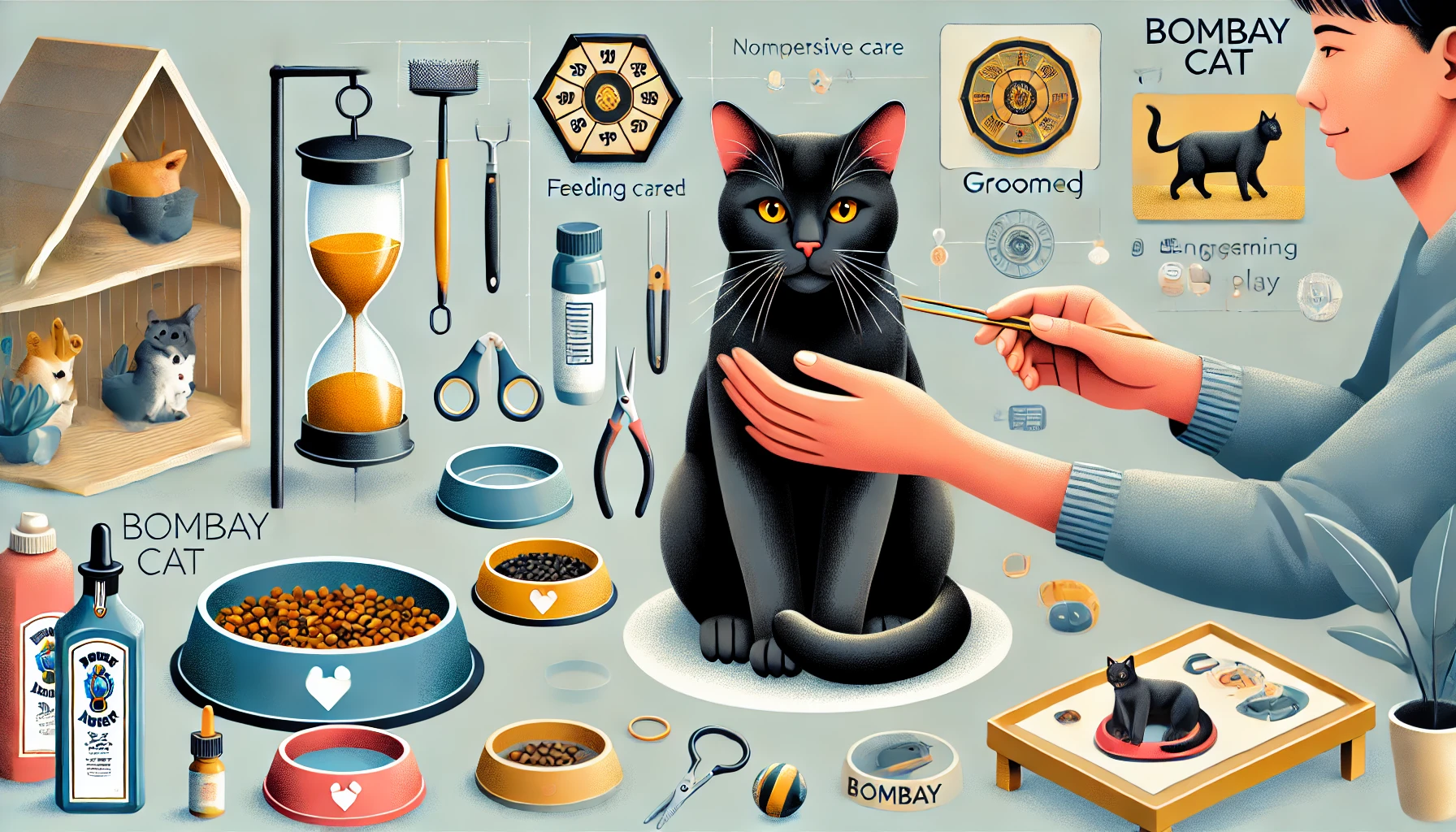
Meeting the Needs of Your Bombay Cat
It amounts to anything more than just giving them food and a rooftop over their heads.
The Bombay Cat is without a doubt a variety that requests standard human collaboration and mental and actual excitement to keep them cheerful and solid.
By furnishing your Bombay Cat with an even eating routine, ordinary preparing, and a lot of play, you will guarantee it’s consistently in the most ideal condition.
Also, regular visits to the vet will permit medical issues to be distinguished right off the bat and for general wellbeing.
- Adjusted Diet: A protein-rich eating routine will do ponders for your Bombay Cat to keep up with its strong form and energy levels.
- Ordinary Prepping: A week after week brushing and normal tests can assist with making their jacket sparkling and keep one’s wellbeing in great check.
- Action Play: Give exercises and recess to your Bombay Cat to keep them both intellectually and genuinely invigorated.
- Veterinary Consideration: Standard visits to a vet can distinguish issues sufficiently early to be tended to and ensure a lengthy personal satisfaction.

Adopting a Bombay Cat: A Rewarding Experience
Whether you choose to take on from a haven or purchase from a mindful raiser, making a Bombay Cat a piece of your life is an exceptionally compensated choice.
The felines are fortified firmly with the proprietors and of steadfast and affectionately arranged nature.
Planning of the home climate for a Bombay Cat and information on their extraordinary requirements will help in establishing a cherishing and strong climate for your feline to develop and flourish in.
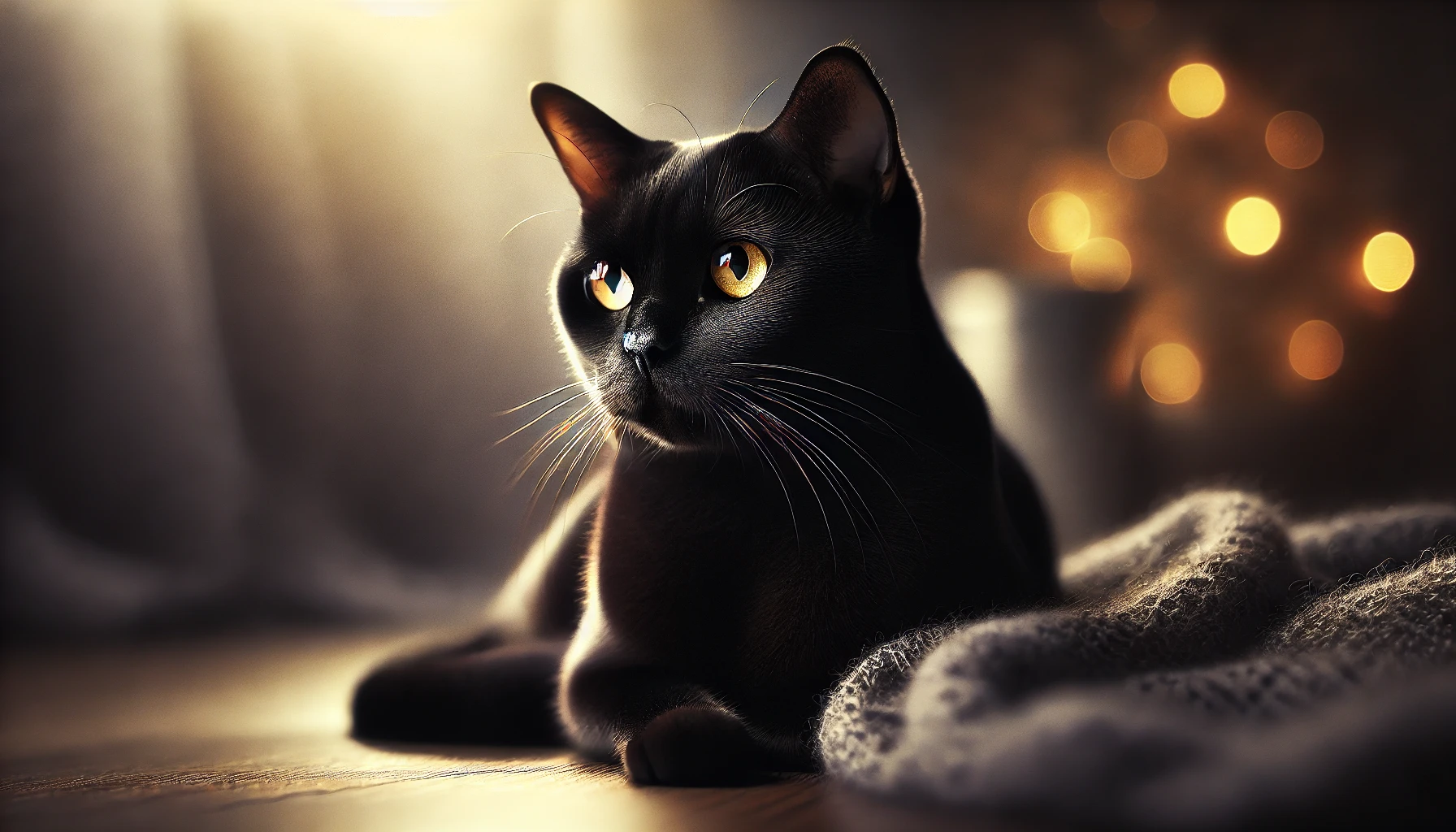
Final Thoughts on the Bombay Cat
This variety of the Bombay Cat is eminent, giving the best of two universes: it has a smashingly decent appearance that turns eyes and has a warm, delicate character that catches hearts.
Whether it is their intriguing looks or their active nature, the Bombay Cat will doubtlessly be an exquisite expansion to any family.
At the point when you will give the expected consideration, consideration, and love, consequently you will have a dedicated and warm companion for a long time to come.

Frequently Asked Questions About the Bombay Cat
What is the personality of a Bombay Cat like?
Known for its extremely tender and social nature is the Bombay Cat.
They become firmly connected to their lords, appreciate human communication, and for the most part become fun loving, astute, and delicate associates.
How much grooming does a Bombay Cat require?
They have a short and smooth coat, consequently demanding next to no investment for preparing.
A speedy brushing done week by week won’t just leave their jacket sparkling and solid yet in addition furnish some great holding time with your Bombay Cat.
Is the Bombay Cat good with children and other pets?
Indeed, in general, the Bombay Cat endures kids and different pets well.
Their quiet, tame nature empowers them to fit in families, and they fit well with various environs.
What are the common health concerns for Bombay Cats?
Essentially, Bombay Cats are sound, yet they will more often than not become overweight assuming they are overloaded.
Standard visits to the veterinarian and a legitimate eating regimen assist with forestalling normal medical conditions connected with heart illnesses, respiratory hardships, and dental issues.
How do I ensure my Bombay Cat stays mentally stimulated?
Draw in your Bombay Cat with intelligent toys and puzzle feeders, and as a general rule, include customary play.
All things considered, mental feeling is the way to keeping them from getting exhausted and living a blissful, sound life.



